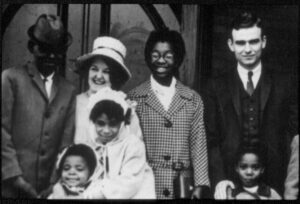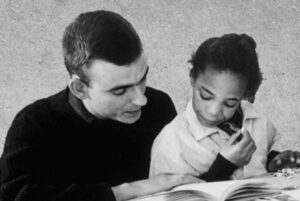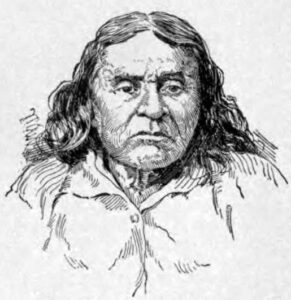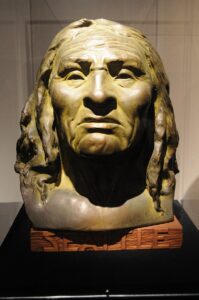Who will face Joanna the Myrrhbearer for the Golden Halo? That's the question of the day, following Joanna's victory over Martin de Porres 58% to 42%, as Chief Seattle faces Jonathan Daniels.
To get to the Faithful Four, Chief Seattle defeated Botulph, John Donne, and Bertha of Kent, while Jonathan bested Rutilio Grande, Josephine Bakhita, and Florence Li Tim-Oi.
In case you missed the last in-season episode of Monday Madness, you can watch it here.
Vote now!
Jonathan Daniels
The Episcopal Diocese of New York, where I serve, held an official “Service of Apology for the Endurance of Slavery” a little over two weeks ago. This liturgy and institutional apology came about after years of work by our Diocesan Reparations Committee and many difficult conversations within parishes all over the diocese.
Reactions were, as you might imagine, mixed. Many were moved by the service; by the effort at institutional responsibility for the spiritual injury of racism. Others felt it didn’t go far enough, that a white male bishop apologized in the midst of a mostly white church hierarchy that remained seemingly unchallenged and unchanged. And still others thought the whole thing was unnecessary; nothing but more talk and self-flagellation about troubles of the past.
By now we’ve all heard countless references to a “racial reckoning” over the last few years in the United States but let’s face it…we’re always having a racial reckoning in the United States. From its founding until now, my country – and because of that, my church – has been locked in a struggle around race and racism. I don’t have the word count to do justice to the harms done to black people by a white supremacist power structure and by white people; nor to sufficiently acknowledge the incredible labor done by black leaders and their allies to move all of us forward; or the degree to which we do not yet have a free society “with liberty and justice for all.”
Within the Episcopal Church, I have been in both majority-white and majority-black spaces (and a few more integrated rooms) where people have had brave and open conversations about their personal biases and the legacy of white supremacy in the church. And I have been in all-white rooms where leaders have said, “this isn’t P.C, but…” We succeed and we fail, and over and over again we doubt one another’s motives and sincerity and struggle with our own defensiveness and pride. And we are the church! Disciples of Jesus Christ who is himself our peace and has through his very body made the two into one and torn down the dividing wall – we could and should be better at this.
 I think Jonathan Daniels would understand all this. He grasped the difficulty and necessity of this whole enterprise. In his writing, no one was defined by their race, or defined by their hate; and he doesn’t seem to have subscribed to the myth of a color-blind society that makes so many people want to brush all of this under the rug in favor of some general niceness. Jonathan understood as Christians we have to thread a difficult needle; both refusing to compromise on the dignity of every human being and refusing to write off people who are mired in bigotry. He knew we have to somehow, some way, bring them along to the Kingdom.
I think Jonathan Daniels would understand all this. He grasped the difficulty and necessity of this whole enterprise. In his writing, no one was defined by their race, or defined by their hate; and he doesn’t seem to have subscribed to the myth of a color-blind society that makes so many people want to brush all of this under the rug in favor of some general niceness. Jonathan understood as Christians we have to thread a difficult needle; both refusing to compromise on the dignity of every human being and refusing to write off people who are mired in bigotry. He knew we have to somehow, some way, bring them along to the Kingdom.
 Because the Kingdom was Jonathan’s goal. He and his friends plunged into the midst of a complex and dangerous social conflict much like Jesus commissioned the 72; they went out like lambs into the midst of wolves, speaking peace and staying wherever they were welcomed. But he never wiped the dust off his feet. He shed illusions of his own perfection and self-righteousness and became braver and more loving, and he was not afraid to take note of that inward journey; of how much he had changed and how much further he had to go to grow in the knowledge and love of God. And he knew ultimately that journey was shared.
Because the Kingdom was Jonathan’s goal. He and his friends plunged into the midst of a complex and dangerous social conflict much like Jesus commissioned the 72; they went out like lambs into the midst of wolves, speaking peace and staying wherever they were welcomed. But he never wiped the dust off his feet. He shed illusions of his own perfection and self-righteousness and became braver and more loving, and he was not afraid to take note of that inward journey; of how much he had changed and how much further he had to go to grow in the knowledge and love of God. And he knew ultimately that journey was shared.
Jonathan Daniels is a mighty witness. He lived and died by our Baptismal covenant and laid down his life for his friends. And enough of him remains with us that he feels real and alive, like the words of that old hymn really are true, that “the saints of God are just folk like me, and I want to be one too.”
Chief Seattle
I live on Osceola Avenue. Osceola was a Seminole leader who resisted the United States’ forced migration of him and his people from Florida. He was betrayed by the United States government after coming to them under a white flag for peace negotiations. He died in prison.
Osceola Avenue is a small residential street in Saint Paul. Saint Paul was established on the ancestral homeland of the Dakota. Saint Paul is located in Ramsey County, in honor of Alexander Ramsey, the first territorial governor of Minnesota. Ramsey mobilized a volunteer army and militia against a collection of Dakota tribes, culminating in the largest mass execution in United States history (approved by the great emancipator, Abraham Lincoln) when 38 Dakota natives were hung in Mankato. Their land had been taken from them and they had been defrauded of millions of dollars by corrupt bureaucrats, so they fought back. We kept records of the white settlers and soldiers killed in the conflict. We have no idea how many Dakota lives were lost (nor how many had starved and died of various diseases after being forced onto a reservation that could not sustain them).
Stories such as these reverberate throughout the history of the United States, even to the present day.
 Chief Sealth was forced to agree to a treaty that would not be honored, his people exiled from a land they had long inhabited. His famous speech (found here) offers a brief theological reflection that should give us pause:
Chief Sealth was forced to agree to a treaty that would not be honored, his people exiled from a land they had long inhabited. His famous speech (found here) offers a brief theological reflection that should give us pause:
The white man’s God cannot love our people or He would protect them. They seem to be orphans who can look nowhere for help. . . If we have a common Heavenly Father He must be partial . . .
I’m not sure I’ve ever seen a more perfect articulation of James Cone’s notion of white theology, a theology that justifies oppression and divinely sanctions egregious acts against those who are marginalized.
 Sealth is a challenging saint for me to reckon with. His words and witness force me to confront my own apathy and grapple with the messy intertwined histories of colonialism and Christianity. He boldly spoke truth to power and advocated for those who were being crushed under the inexorable advance of the “manifest destiny.” Foreseeing the human and environmental devastation, he reminded the colonizing powers of the cost. It was to no avail.
Sealth is a challenging saint for me to reckon with. His words and witness force me to confront my own apathy and grapple with the messy intertwined histories of colonialism and Christianity. He boldly spoke truth to power and advocated for those who were being crushed under the inexorable advance of the “manifest destiny.” Foreseeing the human and environmental devastation, he reminded the colonizing powers of the cost. It was to no avail.
Winning the Golden Halo in this absurd and beautiful competition will not rectify the wrongs. But maybe it can remind us of God’s own self-revelation as an emptied and broken human being, one who was crushed by a cruel and unforgiving empire, only to be raised on the third day as promise that one day God would make right the many horrors suffered by people like him. If that hope is not Lenten madness, I don’t know what is.
96 comments on “Chief Seattle vs. Jonathan Daniels”
Thank you for bringing the deeds of Chief Seattle and Jonathon Myrick Daniels to our attention.
From Chief Sealth's speech... "It matters little where we pass the remnant of our days. They will not be many. The Indian’s night promises to be dark. Not a single star of hope hovers above his horizon. Sad-voiced winds moan in the distance. Grim fate seems to be on the Red Man’s trail, and wherever he will hear the approaching footsteps of his fell destroyer and prepare stolidly to meet his doom, as does the wounded doe that hears the approaching footsteps of the hunter." Such sad words..
Today, I'd like to give Chief Seattle a vote simply to honor he and other native tribes treated so terribly by the hands of so many. I live in a state with a native population who have also suffered much...and its time to honor and welcome their words, songs, poems, art and heritage. As stated today, Jonathon Daniels might have entreated us to do just that.
I have supported Sealth and Jonathan every step of the way to the Faithful Four, and although I can see merit in the arguments for both, I will not hesitate to cast my vote for Jonathan Daniels.
I am also a bit amused by those who cannot make a choice and want to call the whole thing off as a tie at the Faithful Four stage. Relax, folks, anything we say or do in this competition is probably of no interest to any of the saints in the competition. This is just a silly game which gives us the opportunity to learn all about these wonderful folks. Neither Jonathan nor Sealth nor anyone else in this competition gains or loses anything because of our votes. They are busy enjoying their heavenly awards while we scratch our heads worrying about who is more worthy. Jonathan and Sealth are probably enjoying a fermented beverage together right now.
Finally, I have no attention in shelling out the funds for four coffee mugs! Onward to the finals, please!
Today my vote is for Indigenous nations around the world that have been subjugated by colonial powers under the guise of turning “non-people” into people if they follow a new God. This is what Chief Sealth/Seattle was fighting against. He wanted people to follow God without coercion and half-truths, but rather by their own joyous acceptance of the love of God. The Doctrine of Discovery was finally rescinded by the Pope last week. That is what Chief Sealth was fighting for! His words can be echoed by all Indigenous tribes globally who are fighting for recognition, reconciliation, truth, justice, and care of Creation. Jonathan Daniels represents a bridge to quell a schism within the United States that is growing wider and wider - evidenced by what we are witnessing today with radical right-wing Trumpism and huge racial inequality. It’s an issue the people of America have to reckon with. Chief Sealth’s ministry and theology is a global call still relevant today that has far-reaching repercussions for all Christians and our relationships with Indigenous people the world over.
I am struck by how everyone in the Final Four has to do with marginalized people: poor people, mixed race people, women, Blacks, Native Americans. I think this is powerful and positive testimony.
I am however saddened by the nastiness that appears in some of the comments today. (Fortunately, few!) Voting for someone who represents one sort of marginalized person is not a statement against other sorts of people. This is not a contest over who’s been the bigger victim. This is not a zero sum game.
I’m also noticing a theme I’ve seen before in Lent Madness comments, that people coming from backgrounds of privilege are somehow less virtuous and their actions less courageous and/or significant because they had an easier start in life. This cropped up, for instance, with William Wilberforce, ignoring the bazillions of his peers who did nothing with their lives but chase foxes and eat themselves into gout. On the contrary, I think it is especially hard for those of us who are privileged to step away from that. And I think that’s supported by how Jesus talks about it.
Thank you, Barbara, for saying this with such clarity and even handedness. I have been thinking many of these same thoughts for several hours now, but just not speaking out. Suffering is not a zero sum game; it's not a contest. Jesus calls us where we are, whether that's a place of privilege or a place of oppression or a mix of both. What matters is how we respond. We are all trying to open our eyes and our minds and hearts to see others as Jesus would have us see them (and not through the distortions the world gives us) and follow the Way. By our very natures we are going to do an imperfect job of it. That's why there's grace and compassion for each one of us, in our different situations, with our different joys, gifts, burdens, and sorrows. So how do we each serve to bring God's grace and compassion to the world around us?
Thank YOU for your spiritual insights! "Jesus calls us where we are - what matters is how we respond." I think I need THAT on a mug.
I so wanted to vote for both! Applause to Eva Suarez and David Creech for making this an impossible choice! Since wisdom (and our fearless leaders) won't allow a vote for both, I ultimately had to vote for Chief Sealth on the basis that I live in Seminole County. Whoever doesn't win this round needs to show up in a future one!
Chief Seattle was Catholic and his baptismal name was Noah. He was a man of dignity and faith despite the hardships visited upon his people. Promise after promise from the governments were broken. While Noah found favor with the Lord and planted a vineyard, Sealth was consigned to a reservation on Kitsap Penninsula. For the 6 years we lived in Kitsap, we brought all our visitors to his gravesite and to read his words. I am sorry two of my favorite people are in competition. I voted for Daniels before, I am old enough to remember his sacrifice. But I also remember the history of Chief Sealth. He got my vote.
A modern day saint and true martyr. I had to vote for him!
BUT it is getting tougher and tougher to choose aas we near the end!
I voted for Jonathan Daniels, “a mighty witness. He lived and died by our Baptismal covenant and laid down his life for his friends. And enough of him remains with us that he feels real and alive, like the words of that old hymn really are true, that “the saints of God are just folk like me, and I want to be one too.”
This is a very difficult decision. Both men were speaking up for a group that was being trod upon by the whites in government. The difference is that Jonathan chose to speak up. Sealth had to fight for his own people, Jonathan could have stayed home and stayed out of it but he chose not to.
I hate to put in this negative note on David Creech's commentary on Chief Seattle....In recounting the mass execution of 38 Dakota here in Minnesota, and a side sneer at "the great emancipator", he left out the fact that over 300 Dakota were initially condemned to be hung. Lincoln commuted the sentence of 265 of them after intervention by our Episcopal Bishop Henry Whipple.
The Dakota tragedy was indeed a tragedy. But there was grace as well in the midst of all that death... something to recall as well in Holy Week
Thanks so much to Eva and David, and again to all the bloggers These are magnificent write ups and they make a choice difficult. I have learned so much from the bloggers and some great comments today and all through this season of Lent Madness Thank you all!
I wish our presidential elections could be like this, where you have two amazing candidates and it is extremely difficult to pick one. You do so, though, anyway, knowing that even if your candidate loses, you won’t be disappointed in the results.
I don’t know what happened, but my email got kicked off Lent Madness last week. I signed up again, but have missed the last 2 or 3 votes. Go Johnathan Daniels, all the way!
I am so unhappy that I missed voting yesterday! Chief Sealth was the saint for me!